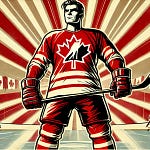We haven't done a show on Canadian politics for a year, so it was good to get Laura Babcock and Adam Schaan back together to understand the demise of the Canadian Prime Minister. In 2015, Justin Trudeau emerged as a beacon of progressivism, capturing the world’s attention with his charisma, optimism, and promises of "sunny ways." As the son of former Prime Minister Pierre Trudeau, he embodied a sense of legacy while ushering in a fresh, modern approach to governance. Trudeau’s Liberal Party swept to power with a majority government, riding a wave of enthusiasm for progressive policies like legalizing marijuana, implementing a carbon tax, and advancing gender equality in his cabinet.
However, nearly a decade later, Trudeau's resignation signals the end of an era—one marred by economic struggles, political gaffes, and growing disillusionment among voters. His downfall aligns with a broader global trend of anti-incumbency and the rise of populist right-wing leaders, reflecting shifting political landscapes in many Western democracies.
The Rise of Trudeau: A Progressive Icon
Trudeau’s ascent in 2015 came at a time when progressive ideals were gaining traction globally. He presented Canada as a bastion of inclusivity and environmental stewardship, contrasting sharply with the conservatism of his predecessor, Stephen Harper. The Liberals’ early successes included revitalizing Canada’s international reputation and implementing socially progressive policies, which made Trudeau a darling of the global Liberal elite.
During the COVID-19 pandemic, Trudeau’s government was lauded for its swift and decisive actions, providing financial relief to citizens and maintaining a relatively low death toll compared to other nations. His leadership was seen as a model of compassion and pragmatism in a crisis.
The Fall: Scandals, Economic Struggles, and Political Mistakes
Yet, as with many long-serving leaders, Trudeau’s popularity began to wane. The initial cracks appeared with ethics scandals, such as the SNC-Lavalin affair, which tarnished his image as a principled leader. Meanwhile, Canada faced mounting economic challenges, including sluggish growth, a housing crisis, and soaring inflation, which left many Canadians feeling financially strained.
"What Trudeau seemed to do is be out of touch," said Laura Babcock, a media strategist. "I think he thought that his personality and his association with the great Canadian brand from his father was going to carry him through."
Trudeau’s ambitious immigration targets, while economically motivated, further exacerbated the housing shortage and strained public services, fueling resentment among some segments of the population. His handling of the 2022 trucker protests and vaccine mandates deepened divisions, with critics accusing him of authoritarian overreach.
"Trudeau became singularly, hugely unpopular and hated," Babcock added. "It’s a generational thing—many governments have not invested in housing and infrastructure in this country."
Global Trends: The Anti-Incumbency Wave
Trudeau’s fall is part of a larger global phenomenon. Across the West, voters have increasingly turned against incumbent leaders, frustrated by economic inequality, cultural shifts, and a perceived disconnect between governing elites and ordinary citizens. The rise of populist leaders like Donald Trump in the United States, Giorgia Meloni in Italy, and Viktor Orbán in Hungary underscores this trend.
Pierre Poilievre, the leader of Canada’s Conservative Party, has adeptly capitalized on this discontent. Employing rhetoric reminiscent of Trump’s 2016 campaign, Poilievre has positioned himself as a champion of the "have-nots" against the "have-yachts," focusing on affordability and economic insecurity. "He owns that lane," said Adam Schaan, a Western Canadian political observer. "His empathy and pounding the table about the threats of impending inflation have resonated deeply with working-class Canadians."
The Populist Right and Economic Nationalism
Poilievre’s rise reflects a growing appetite for economic nationalism and skepticism toward globalisation. His focus on class struggle and practical solutions—such as addressing food insecurity and housing affordability—has distinguished him from traditional conservatives who prioritize fiscal austerity.
"Poilievre’s populism has taken a different form," Khan explained. "It’s far more moderate than what you would see out of the right wing in the United States. He’s talking about economic concerns rather than social conservatism."
While Poilievre’s rhetoric is less socially divisive than some of his populist counterparts, his appeal lies in his ability to connect with working-class voters and articulate their frustrations. This shift mirrors broader political trends in which populist leaders harness economic grievances to consolidate support.
A New Chapter for Canada
As Trudeau steps aside, the Liberal Party faces an uncertain future. Potential successors like Mark Carney, a seasoned economist and former Bank of Canada governor, may attempt to rebuild the party’s credibility by emphasising fiscal responsibility and pragmatic governance. During the podcast, I posed the question: "Does Canada want a technocrat leader at the helm, even if only for a short time? Surely the tenor of the times in 2025 calls for someone who can address practical concerns rather than merely focusing on deficits and budgets in a wonkish way." However, the Liberals will need to grapple with the deeper structural issues that have eroded their support.
The upcoming federal election, likely to result in a Conservative majority, marks a turning point for Canada. Whether this shift leads to meaningful economic reforms or exacerbates existing divides remains to be seen.












